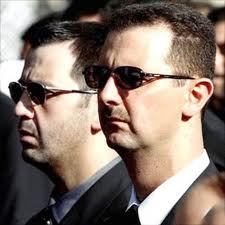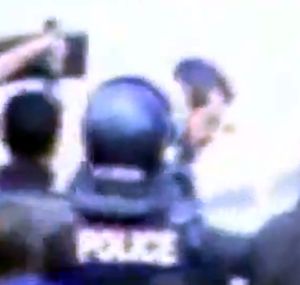By KATHERINE ZOEPF and ANTHONY SHADID
 As reports mount of defections in the Syrian military and the government staggers from the killing of soldiers and police officers in a northern city this week, President Bashar al-Assad may turn increasingly to his brother, Maher, whose elite units in a demoralized army could prove decisive to his government’s survival, activists and analysts say.
As reports mount of defections in the Syrian military and the government staggers from the killing of soldiers and police officers in a northern city this week, President Bashar al-Assad may turn increasingly to his brother, Maher, whose elite units in a demoralized army could prove decisive to his government’s survival, activists and analysts say.
Maher al-Assad heads the Syrian Army’s elite Fourth Division and Republican Guard, while wielding great influence in Syria’s powerful intelligence services, analysts say. In the nearly three-month uprising, he has emerged as a lightning rod of dissent over his perceived role in the ferocious crackdown that has led to the deaths of 1,300 people, by activists’ count, and the arrests of more than 10,000.
To many, Maher al-Assad’s power has underscored the narrow circle his brother presides over — a circle that relies on connections of clan, family and friendship, and that has proved far less tested by crisis than the ruling elite their father cultivated over three decades.
The president’s brother is so much at the center of that clique that many Syrians fervently believe he is the unidentified man who is shown taking potshots at demonstrators in a sensational video now in wide circulation.
Though neither the video nor the gunman’s identity could be independently verified, the fact that so many Syrians believe it to be he is a telling insight into the power and fear he has cultivated.
According to Bassam Bitar, a former Syrian diplomat who now lives in exile in Virginia, Maher al-Assad’s control of Syria’s security apparatus makes him “first in command, not second in command.”
Since childhood, Bashar al-Assad has had a reputation in his family as the weaker, more hesitant personality, Mr. Bitar said.
“Sometimes I think Bashar means it about reform,” Mr. Bitar said. “But his brother won’t take it.”

In many ways, Mr. Bitar said, the relationship between President Assad and his younger brother mirrors the relationship of their father, Hafez al-Assad, with his younger brother Rifaat, who served as the government enforcer and was the architect of the 1982 Hama massacre, in which at least 10,000 people were killed.
“If you look back at the uprising from ’79 to ’82, Rifaat was the nasty guy, the killer,” Mr. Bitar said. “And now history repeats itself, and Maher is a nasty guy.”
The bloody events this week seemed to have marked a decisive moment in an uprising that has posed the gravest challenge to the family’s 41-year rule.
On Monday, the government claimed that 120 soldiers and police officers had been killed in a town called Jisr al-Shoughour by armed gangs — a common euphemism for protesters. Some residents and opposition activists claimed some of the soldiers had been killed by their colleagues for defecting, though it was impossible to verify either account.
If the residents’ accounts are true, it would mark an extraordinary fissure in a government that has so far maintained the relative unity of the armed forces and the state in the face of the uprising. Though lower-level defections have been reported for weeks, nothing has approached the level of Monday’s bloodshed in Jisr al-Shoughour.
“Now there are clashes between the soldiers on one side and security men and young people on the other,” said Omar, 28, a resident there reached by phone on Monday night. “Tens of soldiers began to stand with civilian protesters and families. The civilians are presenting first aid to some soldiers who get shot by the secret police.”
Saeb Jamil, an organizer from Jisr al-Shoughour, said local people were providing logistical support to defecting army officers, helping them monitor the area, and accompanying them during their patrols. He said doctors and nurses had deserted the hospital on Tuesday, fearing reprisals from government forces. Hundreds, perhaps thousands, had fled the town, he said, many making their way toward the Turkish border.
“I transferred one member of the security forces to the national hospital in Jisr al-Shoughour yesterday after he was wounded during the confrontations,” Mr. Jamil said by phone. “He told us the intelligence officer ordered the forces to open fire at people but two of them refused, and he shot them. Then the defections started.”
The loss of control of Jisr al-Shoughour would mark a surrender of territory and control for the government, and residents remaining in the town were bracing for a counterattack. One resident, who gave his name only as Ahmed, said men there were organizing checkpoints and trying to set up barricades and even dig trenches.
But, he asked, “what can these barricades do in front of the tanks?” Other mutinies were reported in Idlib Province this week, though details were scant, and activists have documented lower-level defections in places like Dara’a, the southern town where the uprising began, and Baniyas, a coastal city that sits on a sectarian fault line, since April.
Taken together, they seem to have fed off longstanding grievances within the military over poor pay, wretched conditions, official neglect and low morale.
“There’s a campaign in the military telling them that we have Salafis and militias all over Syria,” said Wissam Tarif, head of Insan, a Syrian human rights group that has documented some of the defections, referring to militants.
“When they arrive to these areas, they realize what they are facing is civilians, and of course, they start talking to each other,” he said.
Syrian infantry units tend to be made up of young men from heavily Sunni regions that are poor, rural and knit together by clan. These are the same kinds of areas that have produced the largest protests against President Assad’s government. Soldiers say they often have little more than bread, potatoes and ghee to eat; they earn only about $10 a month. A well-known saying in Syria underlines the miserable life of many soldiers.
“A soldier takes care of himself,” the proverb goes.
But analysts say the state treats the conscript army almost as an appendage to the elite forces that Maher al-Assad controls. Along with the Republican Guard, there is Mr. Assad’s Fourth Division, also based in Damascus, along with the intelligence services.
“The only military divisions that are definitely loyal are the Fourth Division and the Republican Guard, and of course the security forces are loyal,” said Radwan Ziadeh, a human rights activist and visiting scholar at George Washington University in Washington. “These are all forces under the personal control of Maher al-Assad.”
Mr. Tarif called the Republican Guard and the intelligence services the state’s pillars.
“The rest are tools,” he said. “They look at the army as a tool. I think the regime is capable of managing the army. It’s not under the illusion that the army is totally loyal.”
Imad Moustapha, the Syrian ambassador to the United States, denied reports of defections. “The guys who are trying to market this story are trying to insist that the army is suppressing peaceful demonstrators,” he said. “The fact is, the army is engaging in fierce battles with armed criminal terrorists who have committed atrocities in Jisr al-Shoughour yesterday.”
According to several Syrians who know Maher al-Assad, he is highly intelligent, well organized, and cruel — and he has tried to make over Syria’s army and intelligence services in his own image. According to Joshua Landis, an historian of Syria who teaches at the University of Oklahoma, the Assad brothers were carefully groomed by their father for their respective roles: Bashar, the dignified leader, and Maher, the enforcer.
Hafez al-Assad had relied heavily on his own family to consolidate power, Mr. Landis said. “It takes a village to rule Syria — that was Hafez’s great discovery,” he said.
“It’s a family business, and there’s a division of labor,” Mr. Landis said. “And Maher is the kneecapper. That’s his role, and he’s played it well.”
Mr. Bitar, the former diplomat, said: “Maher, how I am going to say, he likes the blood. The minute I saw that video I said immediately, ‘That is Maher.’ ”

Leave a Reply